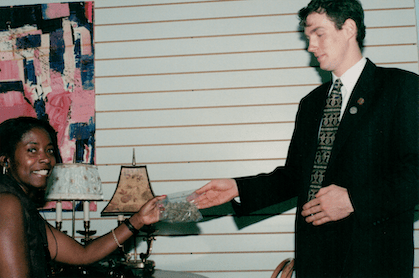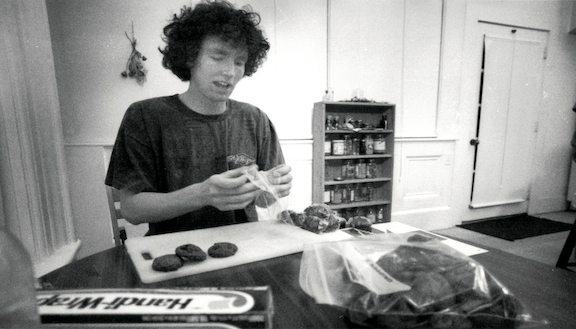Jeff Jones prepares edibles for patients, circa 1995.
The modern cannabis dispensary — and the very term “budtender” — can be traced back to the Bay Area in the late 1980s. A wave of advocates began openly distributing medical marijuana to patients, sparking a cultural and legal shift that shaped the industry we know today.
Inspired by Cannabis Pioneers
At the time, Dennis Peron and “Brownie Mary” Rathbun made national headlines by providing cannabis to AIDS patients in San Francisco. Watching from South Dakota, a young Jeff Jones felt inspired. After losing his father to cancer, Jeff connected deeply with the idea of making cannabis available for those in need.
When he moved west, he visited Peron’s cannabis clubs in San Francisco and decided to bring the model to Oakland. He chose a downtown location that was accessible by transit and highly visible — a strategy that made patients feel included in the community.

In 1998, the Oakland Cannabis Buyer’s Cooperative was briefly allowed to legally provide cannabis to patients by the 9th Circuit Court of Appeals before the US Supreme Court reversed the decision. In this picture, Jeff Jones is shown providing the first legal bag of cannabis to multiple sclerosis patient Yvonne Westbrook after the appeal.
Founding the Oakland Cannabis Buyers’ Cooperative
Jeff launched the Oakland Cannabis Buyers’ Cooperative (OCBC), one of the first dispensaries in the nation. Around the same time, his friend Richard Lee, founder of Oaksterdam University, opened Coffeeshop Blue Sky.
“Richard really liked the idea of making it like a bar and calling it a ‘bud bar,’” Jeff recalls. “I always described it more like a dispensary — a medical office where patients received medicine based on their doctor’s recommendation.”
The terms “dispensary” and “budtender” stuck and remain industry standards today.
Advocacy, Innovation, and Legal Battles
In 1996, California voters passed Proposition 215, legalizing medical marijuana and sparking decades of reform. But at the federal level, cannabis remained illegal. Jeff faced multiple arrests, including the landmark United States v. OCBC case argued before the Supreme Court. Although he did not prevail, his work helped pave the way for cannabis legalization nationwide.
At OCBC, Jeff and his team thought of themselves as therapeutic counselors.
“We would completely unveil what cannabis could be for patients — edibles, pills, flowers, vaporizing. We guided them to the solution that fit their needs.”
Jeff also ran a cultivation operation and distributed clones, aiming to make cannabis more affordable.
The Patient ID Center
When federal pressure forced OCBC to close, Jeff pivoted. He founded the Patient ID Center, issuing pre-verified identification cards to cannabis patients. These cards offered recognition, legitimacy, and protection. Over more than two decades, Jeff issued around 150,000 ID cards before closing in 2020.
“I always told people I will be here as long as we are needed. When needs change, I have to change my mission.”
Budtending Then and Now
Today, Jeff continues to teach as a horticulture instructor at Oaksterdam University. He observes how the budtender’s role has evolved as cannabis becomes mainstream.
“A budtender in the past was both an interpreter and a guidance counselor,” Jeff says. “Today, it’s not much different, but budtenders also get to advocate. They interact directly with the public and provide feedback to officials, shaping future policy.”

Horticulture Professor Jeff Jones
“A budtender in the past was both an interpreter and a guidance counselor. They needed to interpret the patient’s problem and then guide them into their solution,” Jeff says. “Today, it is not much different, but budtenders also have the opportunity to advocate as new policies are shaped. Budtenders get to talk to the public and give feedback to public officials that could, long-term, actually push these issues in a more legitimate fashion because they are the ones on the front line.”
This story is excerpted from The Budtender’s Guide: A Reference Manual for Dispensary Professionals and Cannabis Consumers. Published by Oaksterdam University, the book is a quick start guide perfect for those who want to become budtenders, or consumers who want to be their own budtenders. To learn more about Oaksterdam’s Budtending Certification Program, click here.
Learn More with Oaksterdam’s Live Budtending Certification
Jeff Jones’s story is one of many that shows how budtending has evolved — from its activist roots to today’s professional dispensary roles.
If you want to follow in the footsteps of pioneers like Jeff and build your own future in cannabis retail, join Oaksterdam University’s Live Budtending Certification Program.
This interactive program gives you:
-
Real-time classes with expert instructors
-
Hands-on training in customer service and product knowledge
-
The skills to advocate for consumers and advance your cannabis career
👉 Reserve Your Seat in the Live Budtending Certification Program
